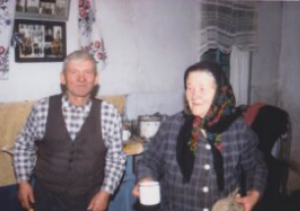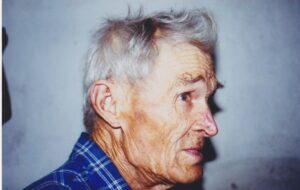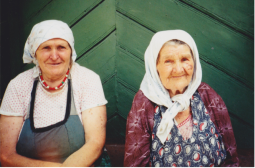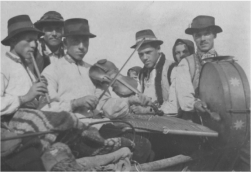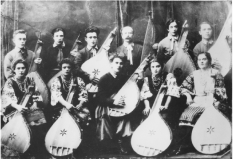—When you worked there gathering pine cones, was it enough for you to buy food and clothes?
Oleksandra Fedotivna: Not at all. I’d walk in the snow gathering the cones. The boss himself saw how hard I worked carrying those loads in the snow. One time, he asked, “Why are you crying, daughter?” I said, “I gathered the cones in the snow, but I was robbed. Now I have nothing.” There were three of us girls, and he sent us to sort potatoes in the cellar. At least, we could warm up there. Upstairs, the men were doing their work, so we’d take some potatoes to them.
Oleksandra Fedotivna Marchenko (Cherkasy region)
—When did you start voting: before or after the war?
Oleksandra Fedotivna: I think it was after the war. I didn’t go to vote.
—Do you vote now?
Oleksandra Fedotivna: No.
—How was voting back in the day?
Oleksandra Fedotivna: We didn’t vote because there were no good candidates. I remember during the first elections there was a strict order for everyone to stay home and wait for the representatives to come and take their vote. I hid in the house. A teacher came and asked the neighbors where I was. They said, “She’s not there because the door is closed.” I was standing in the house all this time. He went looking for me and then left. They told me they would evict me, but I went to the village council and said I wasn’t home at the time.
Oleksandra Fedotivna Marchenko (Cherkasy region)
—Did people sing koliadky before or during collectivization?
Oleksandra Fedotivna: People sang koliadky in the evening. We loved to do it.
—Did you dress up? Did you go with the guys or separately?
Oleksandra Fedotivna: Girls went on their own, without the guys, because if they went together, there’d be a lot of laughter and they’d mix up the words. My mother used to say that boys did posypannia, and girls were not supposed to. If boys went to a house to do posypannia, the first one would get more money. The ones from the West did a very good job.
—Did people sing koliadky after the war?
Oleksandra Fedotivna: Yes, they did. People will go caroling as long as they remember how their ancestors did it.
Oh, on Christmas Eve Jesus walked around the house,
Collecting the dew from the sky, saying:
“Oh, give me, girl, some water to drink.”
God walked down the road,
And met a girl who carried the water.
“Oh, girl, give me some water to drink.”
(But she was a sinner.)
She says,
“I won’t give you this water because it is impure:
The sand from the mountain and the leaves from the trees got into it.”
God says,
“You’re impure, girl,
Because you gave birth to a child,
And drowned it in this water.”
The girl dropped the bucket in surprise.
God said,
“Don’t be afraid, girl.
Go to the church for a confession.
Confess your sins.”
Oleksandra Fedotivna Marchenko (Cherkasy region)
—How did you party when you were young?
Oleksandra Fedotivna: We used to gather and party outside with the girls.
—Did you have any vechornytsi?
Oleksandra Fedotivna: Yes, we’d gather there in the evenings to sew and spin yarn.
…………………………………………………………………………………
—When the kolhospy began, did the vechornytsi continue?
Oleksandra Fedotivna: When the kolhospy began, they started forcing people to work, so there were no more vechornytsi.
Oleksandra Fedotivna Marchenko (Cherkasy region)
Oleksandra Fedotivna: We sang the revolutionary songs. One time, I sang Shche ne vmerla Ukraiiny, ni slava ni volia (“Ukraine has not yet perished, neither glory nor freedom”) – that is, Ukraina. Next day, they came to my house, “What song did you sing?” — “I didn’t sing anything.” — “Did you sing ‘Ukraine has not yet perished?’” They interrogated me, but I didn’t say anything. Then they said, “If you sing this song again, you won’t be able to sing anything anymore.” I was frightened.
—Who were these people that threatened you?
Oleksandra Fedotivna: I don’t know where they were from. I guess they were from the regional administration.
—When was this?
Oleksandra Fedotivna: I sang that song when I was a child.
Oleksandra Fedotivna Marchenko (Cherkasy region)
—When you worked there gathering pine cones, was it enough for you to buy food and clothes?
Oleksandra Fedotivna: Not at all. I’d walk in the snow gathering the cones. The boss himself saw how hard I worked carrying those loads in the snow. One time, he asked, “Why are you crying, daughter?” I said, “I gathered the cones in the snow, but I was robbed. Now I have nothing.” There were three of us girls, and he sent us to sort potatoes in the cellar. At least, we could warm up there. Upstairs, the men were doing their work, so we’d take some potatoes to them.
Oleksandra Fedotivna Marchenko (Cherkasy region)
—When did you start voting: before or after the war?
Oleksandra Fedotivna: I think it was after the war. I didn’t go to vote.
—Do you vote now?
Oleksandra Fedotivna: No.
—How was voting back in the day?
Oleksandra Fedotivna: We didn’t vote because there were no good candidates. I remember during the first elections there was a strict order for everyone to stay home and wait for the representatives to come and take their vote. I hid in the house. A teacher came and asked the neighbors where I was. They said, “She’s not there because the door is closed.” I was standing in the house all this time. He went looking for me and then left. They told me they would evict me, but I went to the village council and said I wasn’t home at the time.
